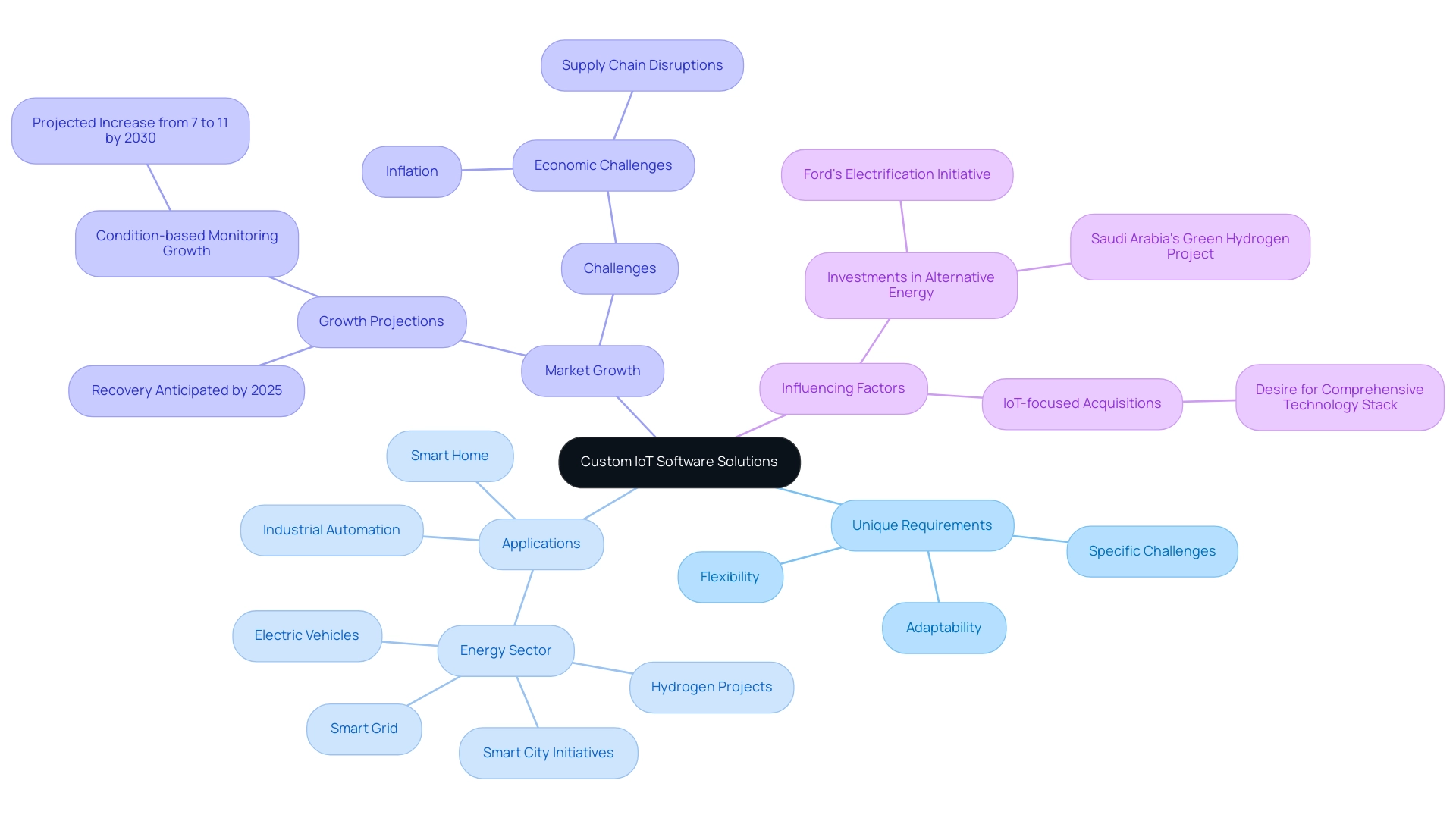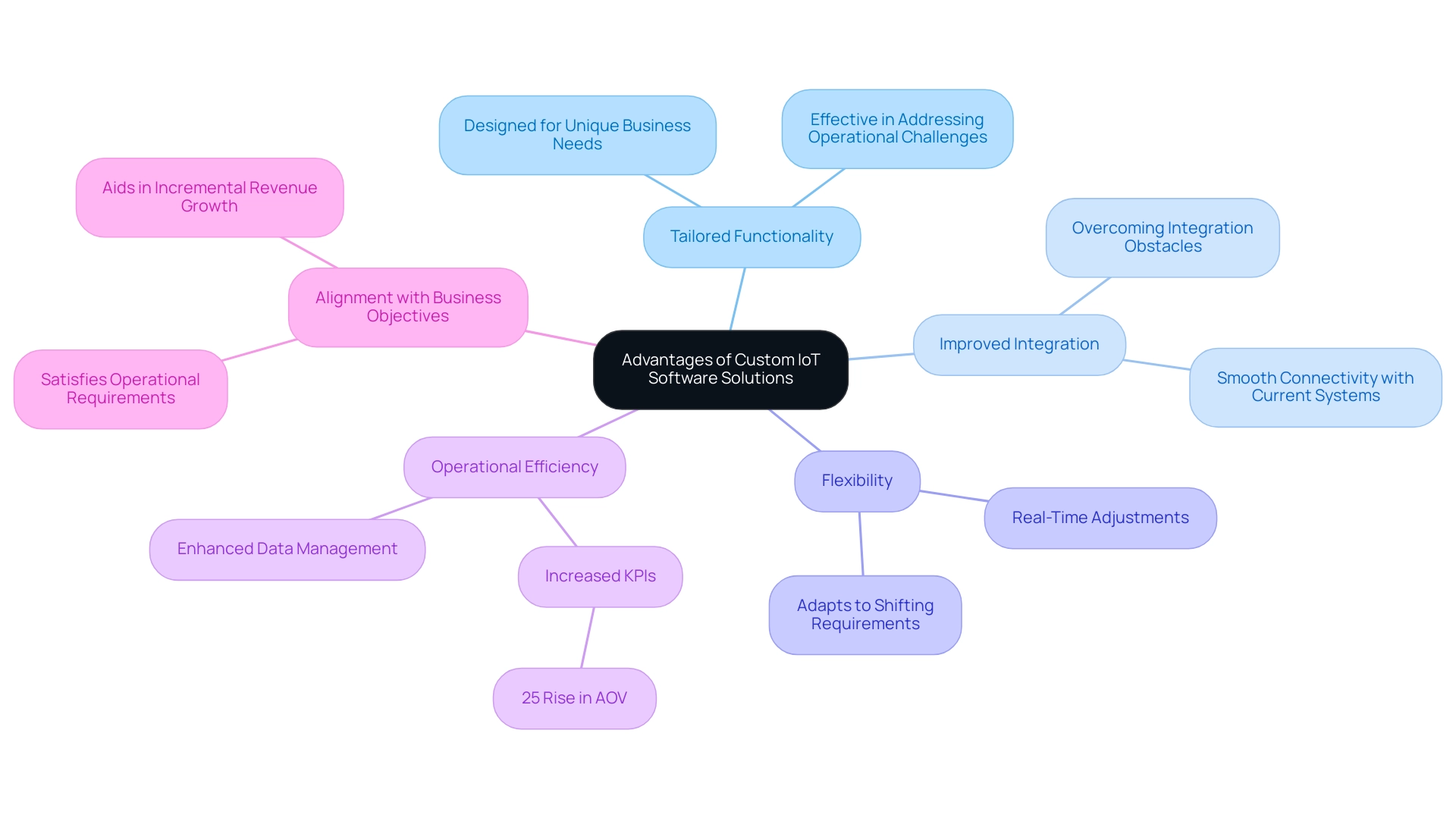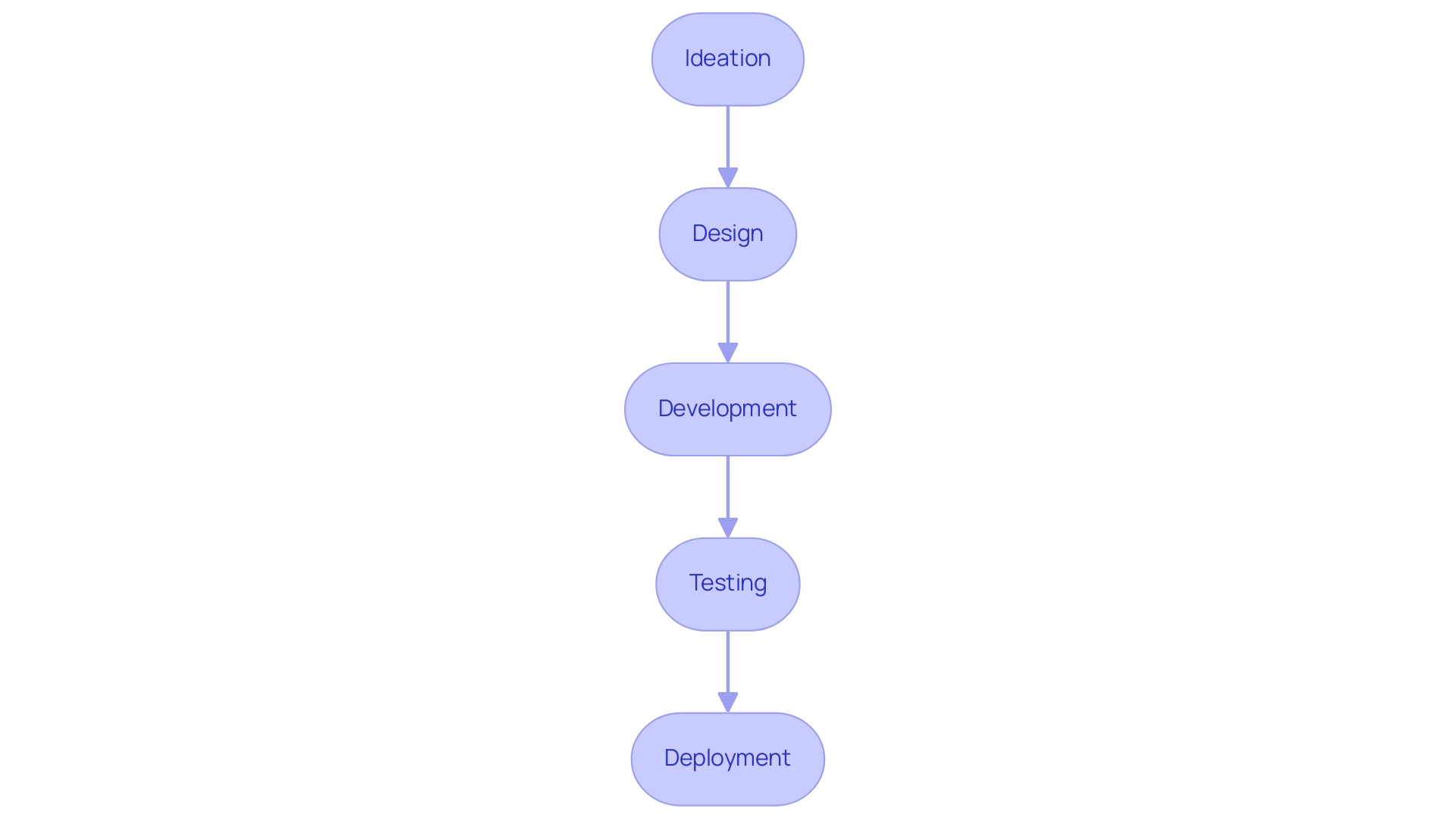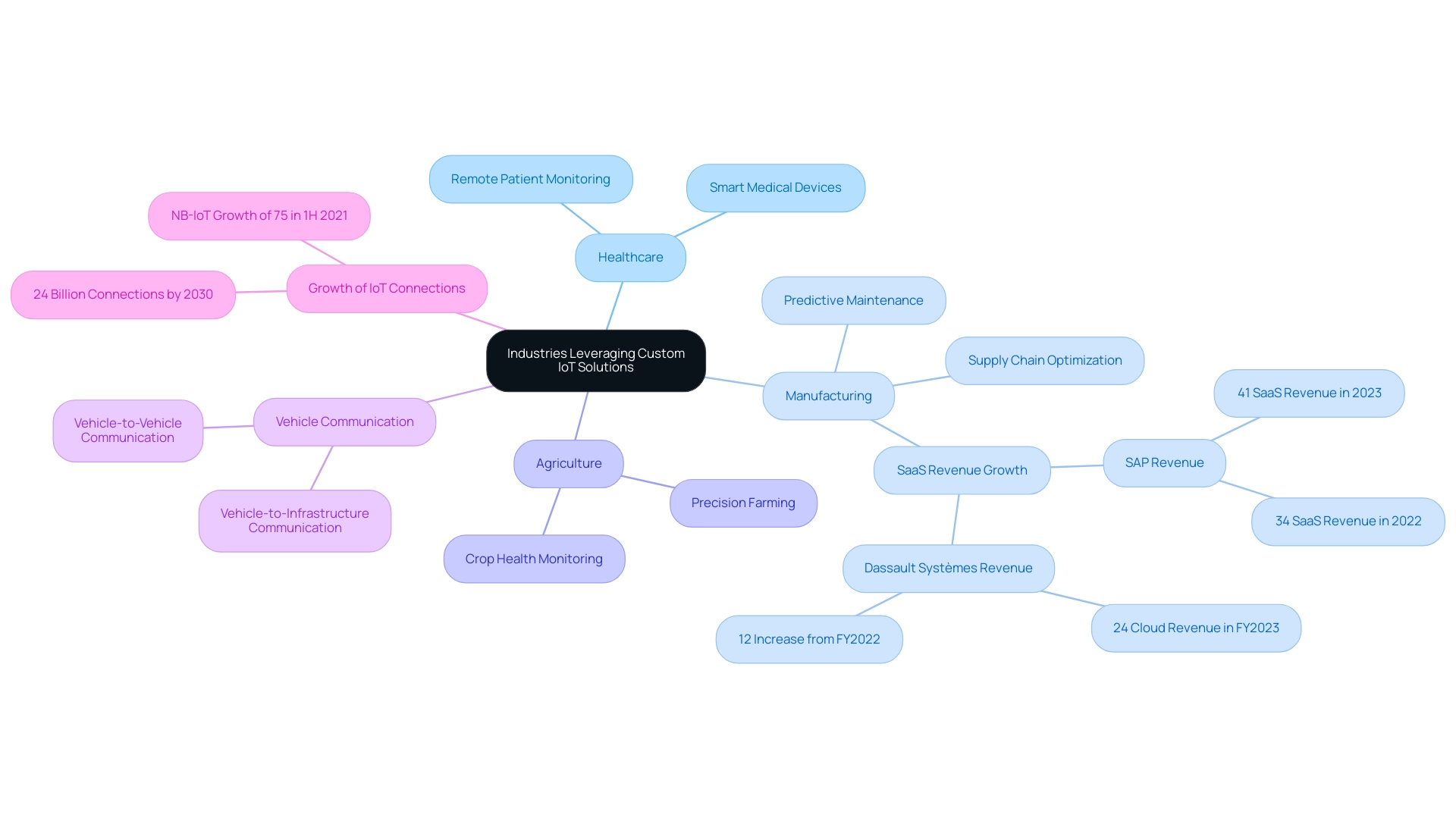Introduction
In an era where the Internet of Things (IoT) is revolutionizing industries, the need for custom software solutions tailored to specific organizational needs has never been more critical. Unlike generic applications, custom IoT software is designed to address unique challenges, offering businesses the flexibility to adapt and thrive in a rapidly evolving landscape.
As the market shifts towards specialized applications, organizations are discovering the significant advantages these bespoke solutions bring—enhancing operational efficiency, driving data insights, and ultimately optimizing user experiences.
From healthcare to manufacturing and agriculture, the transformative potential of custom IoT solutions is reshaping how industries operate and innovate. This article delves into the nuances of custom IoT software, exploring its development journey, advantages over off-the-shelf options, and the diverse sectors that are harnessing its power to propel their growth.
Defining Custom IoT Software Solutions
Custom IoT software solutions are specifically designed to meet the unique requirements of organizations utilizing Internet of Things (IoT) technologies. Unlike generic off-the-shelf options, these custom IoT software solutions effectively address specific challenges and workflows, providing unparalleled flexibility and adaptability. As the IoT landscape evolves, the demand for specialized applications capable of seamless integration with various devices and platforms has surged.
This integration enables businesses to optimize their operations, enhance data collection, and significantly improve user experiences. The scope of these approaches is vast, ranging from innovative smart home applications to complex industrial automation systems, demonstrating their versatility across multiple sectors.
Recent market projections indicate that the condition-based monitoring segment of IoT software is expected to grow its market share from 7% to 11% by 2030, highlighting the increasing reliance on tailored applications. Philipp Wegner notes that although economic challenges such as inflation and supply chain disruptions have affected the enterprise IoT market growth, there is optimism for recovery, with substantial growth anticipated by 2025. Furthermore, numerous significant IoT-centered acquisitions have taken place, motivated by the aim to establish a more comprehensive technology stack, further highlighting the changing environment of IoT offerings.
Furthermore, government and company investments in alternative energy sources, including initiatives like Ford's electrification of its fleet and Saudi Arabia's green hydrogen project, are influencing IoT spending significantly, especially in the energy sector. The case study on reducing fossil fuel reliance demonstrates this trend, highlighting how substantial investments in electric vehicles and hydrogen projects are likely to drive increased IoT expenditure in smart grid and smart city initiatives. As organizations pursue these initiatives, the implementation of custom IoT software solutions will be essential in navigating the complexities and maximizing the potential of their investments.

Advantages of Custom Solutions Over Off-the-Shelf Options
The advantages of custom IoT software solutions significantly surpass those provided by off-the-shelf products. One of the primary benefits of custom IoT software solutions is their tailored functionality, designed specifically to meet unique business needs, ensuring each feature integrated into the system is not only relevant but also highly effective in addressing operational challenges. With more than 20 years of unmatched experience, our offerings have a proven history of improving essential KPIs such as retention rates, Average Order Value (AOV), and Lifetime Value (LTV).
For example, clients who adopted our tailored offerings reported a 25% rise in AOV within the first quarter. Improved integration features represent another significant benefit; custom IoT software solutions enable smooth connectivity with current systems and devices, addressing the integration obstacles frequently encountered with typical programs. Moreover, as businesses evolve, so too can custom IoT software solutions, adapting in real-time to shifting requirements and technological advancements.
This flexibility stands in stark contrast to off-the-shelf products, which may quickly become obsolete or necessitate expensive updates to remain functional. Such advantages collectively drive increased operational efficiency, superior data management, and ultimately, a robust return on investment with custom IoT software solutions. In fact, approximately 36% of organizations worldwide are currently utilizing business process management tools for workflow automation, emphasizing the increasing trend towards tailored approaches that improve operational effectiveness.
Furthermore, our approaches to custom IoT software solutions are crafted to align directly with your internal objectives, ensuring that every implementation not only satisfies operational requirements but also aids in incremental revenue growth. As emphasized by Sri Narayan Shukla, Founder & CEO of Singsys, 'As the bespoke software development market continues to surge, we are at a pivotal moment in technological innovation.' This growth highlights the significance of customized digital approaches in driving business success.
This viewpoint strengthens the essential function that custom IoT software solutions serve in enabling businesses to flourish in a constantly changing environment. Moreover, case studies have indicated that companies utilizing custom IoT software solutions have achieved substantial enhancements in efficiency and ROI, showcasing the concrete advantages these tailored frameworks can deliver.

The Development Journey of Custom IoT Software
The journey of developing custom IoT software solutions includes several essential stages:
- Ideation
- Design
- Development
- Testing
- Deployment
Initially, during the ideation phase, stakeholders pinpoint their specific needs and objectives, laying the groundwork for informed design decisions. The design phase focuses on creating intuitive wireframes and user interfaces, aiming to enhance the overall user experience.
Following this, programmers engage in the development stage, where they write the necessary code and integrate APIs to establish seamless connectivity with IoT devices. This integration is essential, as estimates indicate there will be 40 billion IoT devices by 2025, all of which depend on advanced technological solutions.
To ensure consistent and quality application delivery, many teams adopt CI/CD pipelines, which are used by 82% of Agile teams. Rigorous testing is then conducted to uncover and rectify any bugs or performance issues, ensuring a robust final product. The deployment phase signifies the system's introduction into the operational environment, where continuous monitoring and updates become vital.
This ongoing maintenance is essential for sustaining performance and security, thereby ensuring it remains effective in a rapidly evolving landscape. As Nayan Sharma notes, the transformative potential of custom IoT software solutions is immense, with McKinsey Global estimating that these solutions could contribute between $3.9 trillion to $11.1 trillion annually to the economy by 2025, impacting various sectors including cities, factories, and healthcare. With the emergence of 5G networks, machine learning, and artificial intelligence, which are integral to the development process, the future of IoT in tailored software development promises even more intelligent and adaptable systems, reinforcing the importance of adhering to best practices throughout the development journey.

Industries Leveraging Custom IoT Solutions
Custom IoT software solutions are increasingly influencing a multitude of industries, each reaping the benefits of specialized applications that drive operational efficiency and enhance data insights. In healthcare, these tailored IoT applications are pivotal for remote patient monitoring and the development of smart medical devices, which not only enhance patient care but also significantly lower costs. Recent statistics indicate that by 2030, enterprise IoT connections are projected to reach an astounding 24 billion, underscoring the growing reliance on these technologies.
In the manufacturing sector, custom IoT software solutions enable predictive maintenance and optimize supply chains, leading to increased productivity and reduced downtime. For instance, industrial application vendors are prioritizing the expansion of their SaaS revenue, with SAP reporting that SaaS constituted 41% of its total revenue in 2023, a notable increase from 34% in the previous year. Dassault Systemes also noted that 24% of its FY2023 software revenue came from cloud revenue, marking a 12% increase from FY2022.
Furthermore, the agriculture sector utilizes tailored IoT systems for precision farming, allowing farmers to monitor crop health meticulously and optimize resource usage effectively. In addition, vehicle-to-vehicle and vehicle-to-infrastructure communication is becoming increasingly important, improving road safety and traffic management, which highlights the broader impact of IoT across various sectors. As Satya Nadella, CEO of Microsoft, remarked,
Azure again took share as customers use our platforms and tools to build their own AI applications.
This statement reflects the broader trend of industries adopting custom IoT software solutions to drive innovation and enhance productivity. The transformative potential of these applications is evidenced by the recent innovations in custom IoT software solutions and their substantial impact on healthcare, making them indispensable in today's digital landscape. Additionally, the growth of NB-IoT connections, which surged 75% year-over-year in 1H 2021, emphasizes the increasing reliance on IoT technologies across industries.

Conclusion
Custom IoT software solutions are reshaping the operational landscape for organizations across various sectors, offering tailored applications that address specific challenges and enhance efficiency. The journey of developing these bespoke solutions involves meticulous stages, from ideation to deployment, ensuring that each application is designed to meet the unique needs of its users. The advantages of custom solutions over off-the-shelf options are substantial; they provide enhanced functionality, seamless integration, and the ability to adapt to evolving business requirements, ultimately driving significant returns on investment.
Industries such as healthcare, manufacturing, and agriculture are already witnessing transformative changes due to custom IoT applications. These solutions not only improve operational efficiency but also empower organizations to leverage data insights for informed decision-making. As the demand for specialized applications continues to grow, the importance of investing in custom IoT solutions becomes increasingly evident.
In conclusion, embracing custom IoT software is not merely a trend but a strategic necessity for organizations aiming to thrive in an ever-evolving technological landscape. By harnessing the capabilities of these tailored solutions, businesses can optimize their processes, enhance user experiences, and position themselves for sustainable growth in the future. The investment in custom IoT solutions is an investment in innovation, resilience, and long-term success.





